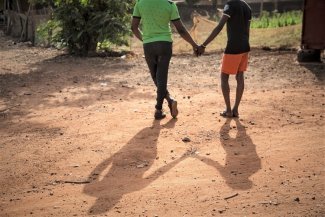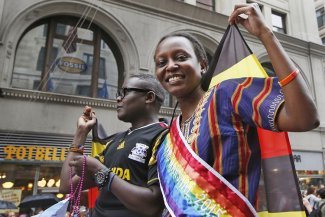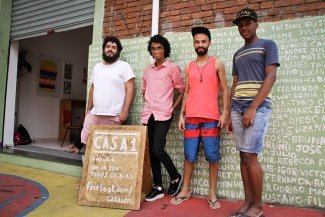Thuli Mbete, a traditional healer or sangoma, pictured here with her two apprentices on 3 November 2022, performs a ritual to help a gay patient in the Rosebank area of Cape Town, South Africa.
“We are not here to change you, we are here to connect with your ancestors,” Thuli Mbete tells a middle-aged man who has just entered the room. Mbete is a sangoma, a traditional South African healer. With the help of her two apprentices, she treats her patients using natural plants; above all, she performs rituals to contact the spirits of their deceased ancestors.
Everyone sits in a circle on a mat. The sangoma lays out objects that are essential for her ritual: small animal bones, tobacco and a ndugku (a stick used to ward off evil spirits). After Mbete lights a candle and burns some sage, the ritual can begin.
Somewhat nervous, the patient says his name and explains why he has come to see the healer: he is gay and has been subject to significant bullying because of his sexual orientation. He knows that he can speak freely here without facing stigma.
“In South Africa, you can be gay if you come from the right social background,” explains Gerhard, a resident of the Pride Shelter Trust, a shelter for LGBTQ+ people in need. “In Cape Town CBD [central business district], it’s gay friendly, there are even gay bars, and it’s not uncommon to see gay couples. But as soon as you leave the nice neighbourhoods, the reality is quite different. In the townships, being queer is like signing your death warrant”.
While South Africa is the only country in Africa to allow same-sex marriage, and its 1996 Constitution was the first in the world to ban discrimination on the basis of sexual orientation, homophobia and violence remain a daily reality. This ranges from name-calling to hate crimes including rape and murder.
Four out of ten LGBTQ+ South Africans know someone who has been murdered because of their sexual orientation or gender identity according to the Triangle Project, an NGO that campaigns for the rights of the LGBTQ+ community. Homosexuality today is still widely considered to be an illness and many people try to get their loved ones ‘treatment’ when they find out that their sexual orientation or gender identity differs from that of the majority.
“Homosexuality is still a taboo for many people. It’s common for people to call me to treat their gay children. It’s a challenge,” says Thuli Mbete. As a queer-identifying person herself, Mbete feels the need to explain to parents what their children are going through.
“Sometimes they think their child is possessed by evil spirits, so I put them in touch with their ancestors to explain to them that their child is perfectly normal. I take the opportunity to remind them that, traditionally, LGBTQI+ people are part of our society. They have always been part of our culture. They are not an anomaly, but because of colonisation, we have forgotten that. Because I’m a healer, they listen to me,” says Mbete.
A legacy of colonisation and apartheid
Not everyone is so lucky. “Among hate crimes, there is a lot of ‘conversion’ rape [where] one or more people will rape a member of the LGBTQI+ community in order to ’make them return to the straight and narrow path’ of heterosexuality,” explains Reverend Sharon Cox, who has been working with the Triangle Project for the past decade. “Most of the time it is gay women who are targeted. When they tell what happened to them, the police rarely take them seriously and they barely get justice. This can drive some victims/survivors to depression and even suicide.”
The stigmatisation of homosexuality is thought to have originated with Dutch (from the 17th century onwards) and English colonisation. The colonisers brought with them the homophobia present in the various branches of Christianity, according to which homosexuality, along with any other form of non-heteronormative behaviour, is a sin.
Because of their connection to ancestors and to nature, the sangomas were labeled as witches. Under apartheid, homosexuality became a crime, as did certain ancestral practices. The sangomas were forced into hiding.
“To become a sangoma, you have to receive a call from your ancestors. It’s something that happens most often in your dreams. My grandmother received this call but she could not follow it because she knew that if she did, there would be retaliation. But she passed on her knowledge to her daughter, my mother, anyway,” says Gogo Ndoni Yezwe, one of Mbete’s apprentices.
Under the Witchcraft Suppression Act, Yezwe’s grandmother could have faced up to 20 years in prison for practicing her gift. The threat of imprisonment, however, did not stop the practice. In 1994, the apartheid regime was abolished and a few years later, the sangomas began to practice in the open again. In 2007, sangomas were legally recognised by the Traditional Health Practitioners Act and were once again able to gain social acceptance.
Sangomas: allies in preventative healthcare
The sangomas are considered to be so important that in 2013, the then deputy minister of health Gwen Ramokgopa said: “We recognise that in our country, many primary health care facilities and hospitals have worked in collaboration with traditional health practitioners to address childhood illnesses such as diarrhea and vomiting, HIV/AIDS and TB, mental illnesses and many others”.
In South Africa in 2019, there were an estimated eight physicians trained in Western medicine for every 10,000 residents. In comparison, Belgium has six physicians per 1,000 people, almost 10 times as many. As a result, sangomas play an essential role in helping South Africans to access health care.
According to the LGBT+ Traditional Healers Group of South Africa, 80 per cent of the population use sangomas. “They come to us because we speak Zulu, Xhosa, Tsonga, etc. Many doctors only speak English or Afrikaans, so they can’t communicate with the population,” explains Mbete.
“To consult a sangoma is to reconnect with one’s African identity. People see that Western medicine is not necessarily better than ours. We take the time to listen to people, we advise them, it’s part of the care.”
This is exactly why the middle-aged man came to consult her. After a series of chants, the ritual begins. Mbete throws the bones onto the mat and begins to interpret them with her apprentices. All of them belch profusely: the presence of the spirits around them is interfering with their digestive system, they will explain later. This does not seem to disturb their patient at all.
According to the arrangement of the bones, Mbete quickly concludes that the man is suffering from headaches, which he confirms. She says that she strongly perceives the spirit of her patient’s grandmother, who protects him and can guide him. A conversation begins and the man confides in her. The sangoma and her apprentices listen to him. He leaves an hour later, feeling lighter.
Unfortunately, not all Sangomas are allies. According to Gogo Ndoni Yezwe: “When I was a teenager, I met a sangoma who told me that he could change me, heal me. Fortunately, at the time I had the support of my grandmother who raised me, so I didn’t get depressed. But it happens. There are sangomas who think that LGBTQI+ people shouldn’t exist but thanks to word of mouth I found another sangoma who gave me the answers I was looking for and I could accept myself.”













